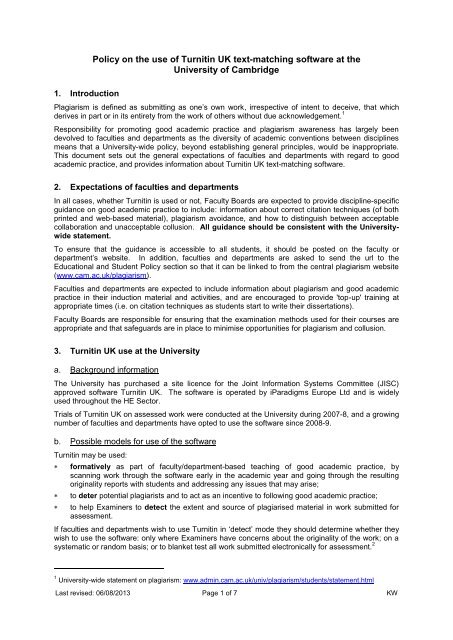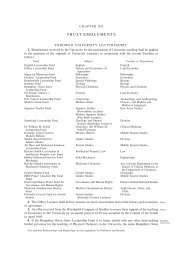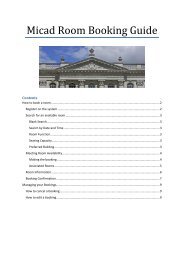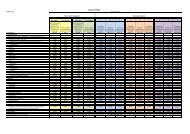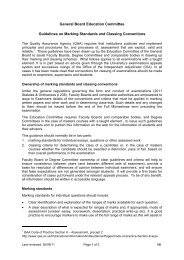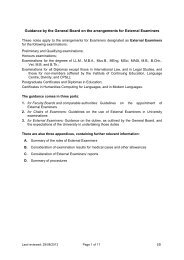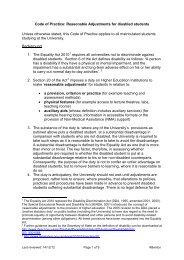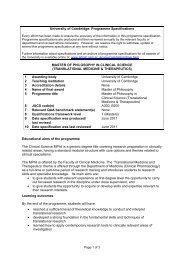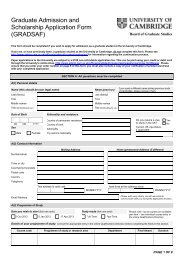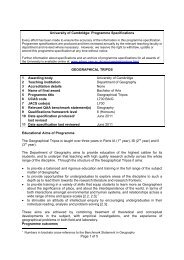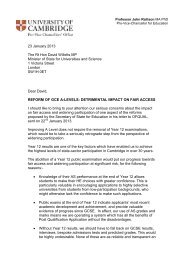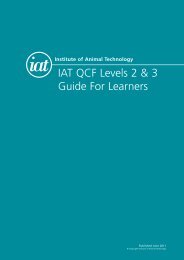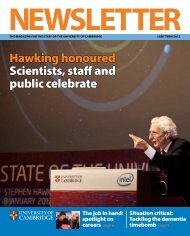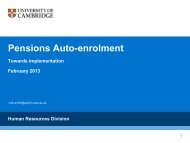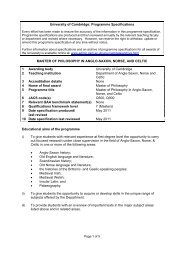Policy on the use of Turnitin UK originality checking software
Policy on the use of Turnitin UK originality checking software
Policy on the use of Turnitin UK originality checking software
Create successful ePaper yourself
Turn your PDF publications into a flip-book with our unique Google optimized e-Paper software.
<str<strong>on</strong>g>Policy</str<strong>on</strong>g> <strong>on</strong> <strong>the</strong> <strong>use</strong> <strong>of</strong> <strong>Turnitin</strong> <strong>UK</strong> text-matching s<strong>of</strong>tware at <strong>the</strong><br />
University <strong>of</strong> Cambridge<br />
1. Introducti<strong>on</strong><br />
Plagiarism is defined as submitting as <strong>on</strong>e’s own work, irrespective <strong>of</strong> intent to deceive, that which<br />
derives in part or in its entirety from <strong>the</strong> work <strong>of</strong> o<strong>the</strong>rs without due acknowledgement. 1<br />
Resp<strong>on</strong>sibility for promoting good academic practice and plagiarism awareness has largely been<br />
devolved to faculties and departments as <strong>the</strong> diversity <strong>of</strong> academic c<strong>on</strong>venti<strong>on</strong>s between disciplines<br />
means that a University-wide policy, bey<strong>on</strong>d establishing general principles, would be inappropriate.<br />
This document sets out <strong>the</strong> general expectati<strong>on</strong>s <strong>of</strong> faculties and departments with regard to good<br />
academic practice, and provides informati<strong>on</strong> about <strong>Turnitin</strong> <strong>UK</strong> text-matching s<strong>of</strong>tware.<br />
2. Expectati<strong>on</strong>s <strong>of</strong> faculties and departments<br />
In all cases, whe<strong>the</strong>r <strong>Turnitin</strong> is <strong>use</strong>d or not, Faculty Boards are expected to provide discipline-specific<br />
guidance <strong>on</strong> good academic practice to include: informati<strong>on</strong> about correct citati<strong>on</strong> techniques (<strong>of</strong> both<br />
printed and web-based material), plagiarism avoidance, and how to distinguish between acceptable<br />
collaborati<strong>on</strong> and unacceptable collusi<strong>on</strong>. All guidance should be c<strong>on</strong>sistent with <strong>the</strong> Universitywide<br />
statement.<br />
To ensure that <strong>the</strong> guidance is accessible to all students, it should be posted <strong>on</strong> <strong>the</strong> faculty or<br />
department’s website. In additi<strong>on</strong>, faculties and departments are asked to send <strong>the</strong> url to <strong>the</strong><br />
Educati<strong>on</strong>al and Student <str<strong>on</strong>g>Policy</str<strong>on</strong>g> secti<strong>on</strong> so that it can be linked to from <strong>the</strong> central plagiarism website<br />
(www.cam.ac.uk/plagiarism).<br />
Faculties and departments are expected to include informati<strong>on</strong> about plagiarism and good academic<br />
practice in <strong>the</strong>ir inducti<strong>on</strong> material and activities, and are encouraged to provide 'top-up' training at<br />
appropriate times (i.e. <strong>on</strong> citati<strong>on</strong> techniques as students start to write <strong>the</strong>ir dissertati<strong>on</strong>s).<br />
Faculty Boards are resp<strong>on</strong>sible for ensuring that <strong>the</strong> examinati<strong>on</strong> methods <strong>use</strong>d for <strong>the</strong>ir courses are<br />
appropriate and that safeguards are in place to minimise opportunities for plagiarism and collusi<strong>on</strong>.<br />
3. <strong>Turnitin</strong> <strong>UK</strong> <strong>use</strong> at <strong>the</strong> University<br />
a. Background informati<strong>on</strong><br />
The University has purchased a site licence for <strong>the</strong> Joint Informati<strong>on</strong> Systems Committee (JISC)<br />
approved s<strong>of</strong>tware <strong>Turnitin</strong> <strong>UK</strong>. The s<strong>of</strong>tware is operated by iParadigms Europe Ltd and is widely<br />
<strong>use</strong>d throughout <strong>the</strong> HE Sector.<br />
Trials <strong>of</strong> <strong>Turnitin</strong> <strong>UK</strong> <strong>on</strong> assessed work were c<strong>on</strong>ducted at <strong>the</strong> University during 2007-8, and a growing<br />
number <strong>of</strong> faculties and departments have opted to <strong>use</strong> <strong>the</strong> s<strong>of</strong>tware since 2008-9.<br />
b. Possible models for <strong>use</strong> <strong>of</strong> <strong>the</strong> s<strong>of</strong>tware<br />
<strong>Turnitin</strong> may be <strong>use</strong>d:<br />
<br />
<br />
<br />
formatively as part <strong>of</strong> faculty/department-based teaching <strong>of</strong> good academic practice, by<br />
scanning work through <strong>the</strong> s<strong>of</strong>tware early in <strong>the</strong> academic year and going through <strong>the</strong> resulting<br />
<strong>originality</strong> reports with students and addressing any issues that may arise;<br />
to deter potential plagiarists and to act as an incentive to following good academic practice;<br />
to help Examiners to detect <strong>the</strong> extent and source <strong>of</strong> plagiarised material in work submitted for<br />
assessment.<br />
If faculties and departments wish to <strong>use</strong> <strong>Turnitin</strong> in ‘detect’ mode <strong>the</strong>y should determine whe<strong>the</strong>r <strong>the</strong>y<br />
wish to <strong>use</strong> <strong>the</strong> s<strong>of</strong>tware: <strong>on</strong>ly where Examiners have c<strong>on</strong>cerns about <strong>the</strong> <strong>originality</strong> <strong>of</strong> <strong>the</strong> work; <strong>on</strong> a<br />
systematic or random basis; or to blanket test all work submitted electr<strong>on</strong>ically for assessment. 2<br />
1 University-wide statement <strong>on</strong> plagiarism: www.admin.cam.ac.uk/univ/plagiarism/students/statement.html<br />
Last revised: 06/08/2013 Page 1 <strong>of</strong> 7 KW
c. C<strong>on</strong>diti<strong>on</strong>s <strong>of</strong> <strong>use</strong><br />
Access to <strong>the</strong> s<strong>of</strong>tware will <strong>on</strong>ly be granted <strong>on</strong> receipt and approval <strong>of</strong> a plan to outline how <strong>the</strong><br />
s<strong>of</strong>tware will be <strong>use</strong>d, and to assure <strong>the</strong> Educati<strong>on</strong>al and Student <str<strong>on</strong>g>Policy</str<strong>on</strong>g> secti<strong>on</strong> that:<br />
1. <strong>the</strong>y will obtain <strong>the</strong> informed written c<strong>on</strong>sent <strong>of</strong> <strong>the</strong>ir students in good time in advance <strong>of</strong><br />
submissi<strong>on</strong>, and ideally towards <strong>the</strong> start <strong>of</strong> <strong>the</strong> academic year;<br />
2. <strong>the</strong>y provide sufficient guidance about good academic practice (which might include <strong>the</strong> formative<br />
<strong>use</strong> <strong>of</strong> <strong>Turnitin</strong> <strong>UK</strong>);<br />
3. <strong>the</strong>y recognise <strong>the</strong> limitati<strong>on</strong>s <strong>of</strong> <strong>Turnitin</strong> <strong>UK</strong> and will review <strong>the</strong> <strong>originality</strong> reports carefully;<br />
4. <strong>the</strong>y will not compromise <strong>the</strong> University's appeals mechanisms;<br />
5. <strong>the</strong>y will keep detailed records <strong>of</strong> how <strong>Turnitin</strong> <strong>UK</strong> is <strong>use</strong>d which can be <strong>use</strong>d in any subsequent<br />
appeal or to help evaluate <strong>the</strong> impact <strong>of</strong> <strong>the</strong> s<strong>of</strong>tware;<br />
6. (for blanket and random screening) <strong>the</strong>y will have robust procedures to separate <strong>the</strong> screening<br />
process from <strong>the</strong> Examiner’s academic evaluati<strong>on</strong> <strong>of</strong> <strong>the</strong> work;<br />
7. <strong>the</strong>ir <strong>use</strong> <strong>of</strong> <strong>Turnitin</strong> <strong>UK</strong> will not disrupt <strong>the</strong> publicati<strong>on</strong> <strong>of</strong> class lists etc;<br />
8. <strong>the</strong> normal investigatory procedures will apply where <strong>Turnitin</strong> <strong>UK</strong> appears to indicate a breach <strong>of</strong><br />
academic integrity.<br />
Faculties and departments must reapply to <strong>use</strong> <strong>Turnitin</strong> <strong>UK</strong> annually and, as part <strong>of</strong> <strong>the</strong> reapplicati<strong>on</strong><br />
process, <strong>the</strong>y will be required to review <strong>the</strong>ir policy and <strong>Turnitin</strong> <strong>UK</strong> usage. 3<br />
All students must be given a full explanati<strong>on</strong> <strong>of</strong> <strong>the</strong> basis <strong>on</strong> which <strong>the</strong>ir work will (or may) be<br />
tested and <strong>the</strong> implicati<strong>on</strong>s <strong>of</strong> submitting <strong>the</strong>ir work to <strong>the</strong> system (in ei<strong>the</strong>r formative or detect<br />
mode). They must sign a c<strong>on</strong>sent form before <strong>the</strong>ir faculty or department can submit <strong>the</strong>ir<br />
work to <strong>the</strong> s<strong>of</strong>tware. 4<br />
4. <strong>Turnitin</strong> <strong>UK</strong> text-matching s<strong>of</strong>tware<br />
a. How <strong>Turnitin</strong> <strong>UK</strong> works<br />
<strong>Turnitin</strong> <strong>UK</strong> is an <strong>on</strong>line service and work must be submitted to it electr<strong>on</strong>ically (Word, RTF, PDF and<br />
o<strong>the</strong>r formats are accepted). No s<strong>of</strong>tware has to be installed locally.<br />
<strong>Turnitin</strong> <strong>UK</strong> may detect direct plagiarism, paraphrasing and collusi<strong>on</strong> as <strong>the</strong> submitted work is<br />
compared with a database <strong>of</strong> material available <strong>on</strong>line and with a ‘private’ database <strong>of</strong> previous<br />
submissi<strong>on</strong>s.<br />
The s<strong>of</strong>tware makes no judgement about whe<strong>the</strong>r a student has plagiarised, it simply shows <strong>the</strong><br />
percentage <strong>of</strong> <strong>the</strong> submissi<strong>on</strong> that matches o<strong>the</strong>r sources. In many cases <strong>the</strong> s<strong>of</strong>tware highlights<br />
correctly cited references or ‘innocent’ matches. Therefore, Examiners must carefully review<br />
<strong>originality</strong> reports to assess whe<strong>the</strong>r <strong>the</strong> work does c<strong>on</strong>tain plagiarism.<br />
Originality reports highlight text which matches o<strong>the</strong>r sources and, where matches are to published<br />
sources or material from students in <strong>the</strong> same examinati<strong>on</strong>, displays <strong>the</strong> matching text and its<br />
immediate c<strong>on</strong>text. Matches to unpublished material submitted by o<strong>the</strong>r instituti<strong>on</strong>s are highlighted,<br />
but <strong>the</strong> source text can <strong>on</strong>ly be seen after c<strong>on</strong>tacting <strong>the</strong> o<strong>the</strong>r instituti<strong>on</strong> for <strong>the</strong> author’s permissi<strong>on</strong>.<br />
Originality reports for individual essays are generally available within minutes: a full dissertati<strong>on</strong> may<br />
take up to an hour.<br />
The s<strong>of</strong>tware <strong>of</strong>fers opti<strong>on</strong>s for excluding quoted material and bibliographies, but <strong>the</strong>se must be<br />
activated manually for each report and are not always effective so do not obviate <strong>the</strong> need for careful<br />
<strong>checking</strong> <strong>of</strong> <strong>the</strong> report to distinguish between innocent matches and plagiarism.<br />
2 See 6a for some <strong>of</strong> <strong>the</strong> advantages and disadvantages <strong>of</strong> different ways <strong>of</strong> using <strong>Turnitin</strong> <strong>UK</strong> in ‘detect’ mode.<br />
3 See Secti<strong>on</strong> 8 for informati<strong>on</strong> about how to apply to <strong>use</strong> <strong>Turnitin</strong> <strong>UK</strong>.<br />
4 See Appendix A for a template <strong>of</strong> <strong>the</strong> student informati<strong>on</strong> and c<strong>on</strong>sent form.<br />
Last revised: 06/08/2013 Page 2 <strong>of</strong> 7 KW
. <strong>Turnitin</strong> <strong>UK</strong>’s search base<br />
<strong>Turnitin</strong> <strong>UK</strong> checks <strong>the</strong> c<strong>on</strong>tent <strong>of</strong> each submissi<strong>on</strong> against:<br />
<br />
<br />
<br />
<br />
previous submissi<strong>on</strong>s to <strong>Turnitin</strong> <strong>UK</strong>;<br />
webpages, including an archive <strong>of</strong> deleted/changed pages;<br />
public domain material from sources such as <strong>the</strong> Project Gutenberg collecti<strong>on</strong>;<br />
selected subscripti<strong>on</strong> services, including a number <strong>of</strong> journals.<br />
c. Limitati<strong>on</strong>s <strong>of</strong> <strong>Turnitin</strong> <strong>UK</strong><br />
<strong>Turnitin</strong> <strong>UK</strong> can be a <strong>use</strong>ful tool but does not <strong>of</strong>fer a soluti<strong>on</strong> to plagiarism. The s<strong>of</strong>tware is not<br />
a substitute for good academic practice in teaching correct citati<strong>on</strong> techniques, nor in<br />
recognising when work does not match <strong>the</strong> known ability and style <strong>of</strong> a student. There are also<br />
significant gaps in its search base. For example, <strong>Turnitin</strong> <strong>UK</strong> cannot:<br />
<br />
<br />
<br />
<br />
<br />
detect plagiarism from books or ‘older’ sources which are not available <strong>on</strong> <strong>the</strong> Internet;<br />
search password-protected essay banks;<br />
detect work which is plagiarised by translati<strong>on</strong> from a n<strong>on</strong>-English source;<br />
search all electr<strong>on</strong>ic journals;<br />
detect plagiarised ma<strong>the</strong>matical equati<strong>on</strong>s.<br />
Therefore, <strong>the</strong> effectiveness <strong>of</strong> <strong>the</strong> s<strong>of</strong>tware will differ between disciplines based <strong>on</strong> whe<strong>the</strong>r <strong>the</strong>ir<br />
critical source material is included in <strong>Turnitin</strong> <strong>UK</strong>’s search database. Fur<strong>the</strong>rmore, a student who is<br />
determined to plagiarise could avoid using sources which are included in <strong>the</strong> <strong>Turnitin</strong> <strong>UK</strong> database or,<br />
if given access to <strong>the</strong> s<strong>of</strong>tware, could feasibly finesse <strong>the</strong>ir wording until plagiarism is undetectable.<br />
In additi<strong>on</strong>, <strong>Turnitin</strong> <strong>UK</strong>:<br />
<br />
<br />
<br />
<br />
<br />
<br />
<br />
is resource intensive (both in training <strong>use</strong>rs and submitting and interpreting assignments);<br />
cannot identify plagiarism <strong>of</strong> ideas;<br />
requires significant manual interpretati<strong>on</strong> <strong>of</strong> reports to distinguish between innocent matches and<br />
plagiarised material;<br />
cannot identify ghost-written essays that <strong>use</strong> wholly original material;<br />
can become slow at peak times beca<strong>use</strong> <strong>the</strong> system slows as usage increases;<br />
might expedite <strong>the</strong> decline in handwriting essays as a skill (if over<strong>use</strong>d);<br />
will not help to teach discipline-specific citati<strong>on</strong> techniques.<br />
In practice, <strong>the</strong> importance <strong>of</strong> <strong>the</strong>se limitati<strong>on</strong>s is likely to vary significantly between academic<br />
disciplines. Individual faculties and departments should take <strong>the</strong>se factors into c<strong>on</strong>siderati<strong>on</strong> in<br />
deciding what, if any, <strong>use</strong> <strong>the</strong>y wish to make <strong>of</strong> <strong>Turnitin</strong> <strong>UK</strong> in assessing <strong>the</strong> <strong>originality</strong> <strong>of</strong> students’<br />
work.<br />
5. Key issues for faculties and departments<br />
a. Informed student c<strong>on</strong>sent<br />
Faculties and departments must obtain a signed declarati<strong>on</strong> from students in good time in advance <strong>of</strong><br />
submissi<strong>on</strong> to c<strong>on</strong>firm that <strong>the</strong>y have read and understood <strong>the</strong> student informati<strong>on</strong> and c<strong>on</strong>sent form<br />
(see Appendix A) and agree to <strong>the</strong> screening <strong>of</strong> <strong>the</strong>ir work as described <strong>the</strong>rein. Ideally c<strong>on</strong>sent<br />
should be obtained at an appropriate time at <strong>the</strong> start <strong>of</strong> <strong>the</strong> academic year i.e. during an inducti<strong>on</strong><br />
sessi<strong>on</strong> <strong>on</strong> good academic practice, or when dissertati<strong>on</strong> titles are agreed. Students should be asked<br />
to reaffirm <strong>the</strong>ir c<strong>on</strong>sent each academic year.<br />
It is also advisable to explain <strong>the</strong> benefits to students <strong>of</strong> using <strong>the</strong> s<strong>of</strong>tware. For example, unless<br />
students specifically opt out, submitted material is retained <strong>on</strong> <strong>the</strong> <strong>Turnitin</strong> <strong>UK</strong> database and<br />
subsequent submissi<strong>on</strong>s are screened against it. This <strong>of</strong>fers protecti<strong>on</strong> against future attempts to<br />
plagiarise <strong>the</strong>ir work. Students should not normally be permitted to opt out <strong>of</strong> <strong>the</strong>ir work being<br />
submitted to <strong>the</strong> s<strong>of</strong>tware unless commercial sensitivity is at stake.<br />
Last revised: 06/08/2013 Page 3 <strong>of</strong> 7 KW
. Intellectual property rights and copyright<br />
The University understands that <strong>Turnitin</strong> <strong>UK</strong> does not infringe students’ intellectual property rights<br />
which will c<strong>on</strong>tinue to reside with <strong>the</strong> original owner (normally students, with <strong>the</strong> excepti<strong>on</strong> <strong>of</strong> some<br />
collaborative or sp<strong>on</strong>sored research projects). <strong>Turnitin</strong> <strong>UK</strong> claims to have no interest in acquiring<br />
intellectual property rights for <strong>the</strong> submitted material. However, it does need a licence to reproduce<br />
student submissi<strong>on</strong>s:<br />
<br />
<br />
to assess <strong>the</strong>m for <strong>originality</strong>;<br />
to retain a copy <strong>of</strong> <strong>the</strong>m for comparis<strong>on</strong> at a later date with future submissi<strong>on</strong>s.<br />
As this goes bey<strong>on</strong>d <strong>the</strong> usual limited copying <strong>of</strong> assessed work by <strong>the</strong> University, it is necessary to<br />
obtain students’ c<strong>on</strong>sent by <strong>the</strong> time <strong>of</strong> submissi<strong>on</strong> (see Secti<strong>on</strong> 5a above). It may be worthwhile<br />
c<strong>on</strong>sulting <strong>the</strong> Staff Student Liais<strong>on</strong> Committee or student representatives before introducing <strong>the</strong><br />
s<strong>of</strong>tware and explaining <strong>the</strong> situati<strong>on</strong> fully to <strong>the</strong>m.<br />
<strong>Turnitin</strong> can be c<strong>on</strong>figured to allow test submissi<strong>on</strong>s which are not retained by <strong>the</strong> system, and so<br />
have no copyright implicati<strong>on</strong>s.<br />
c. Data protecti<strong>on</strong><br />
Material submitted to <strong>Turnitin</strong> <strong>UK</strong> will be identified by students’ examinati<strong>on</strong> numbers, or a unique<br />
identifier created specifically for this purpose. Therefore, pers<strong>on</strong>al data, such as students’ names, will<br />
not be <strong>use</strong>d.<br />
Under <strong>the</strong> Data Protecti<strong>on</strong> Act, faculties and departments are legally obliged to tell students if <strong>the</strong>ir<br />
pers<strong>on</strong>al data is to be <strong>use</strong>d in a way which is not covered under existing c<strong>on</strong>tractual arrangements.<br />
The University can c<strong>on</strong>firm that iParadigms Europe is a member <strong>of</strong> <strong>the</strong> ‘safe harbour regime’ which<br />
means that <strong>the</strong> European Uni<strong>on</strong> is satisfied that <strong>the</strong> data is appropriately protected.<br />
d. Resource implicati<strong>on</strong>s<br />
Faculties and departments should c<strong>on</strong>sider <strong>the</strong> resource implicati<strong>on</strong>s <strong>of</strong> adopting <strong>Turnitin</strong> <strong>UK</strong>, as<br />
significant training and support is likely to be needed, both in how to submit work to <strong>the</strong> system and in<br />
how to interpret <strong>the</strong> reports. The primary <strong>Turnitin</strong> <strong>UK</strong> c<strong>on</strong>tact within each faculty or department will<br />
take resp<strong>on</strong>sibility for training o<strong>the</strong>r <strong>use</strong>rs within <strong>the</strong>ir instituti<strong>on</strong>.<br />
Faculty Boards should issue guidance to Academic Integrity Officers or Examiners <strong>on</strong> how to <strong>use</strong> <strong>the</strong><br />
s<strong>of</strong>tware and interpret <strong>the</strong> reports. Trials indicate that five to ten minutes is needed to review each<br />
<strong>originality</strong> report and decide whe<strong>the</strong>r fur<strong>the</strong>r acti<strong>on</strong> is needed. 5 The time that <strong>Turnitin</strong> <strong>UK</strong> takes to<br />
generate <strong>the</strong> report should also be factored in; this can range from a couple <strong>of</strong> minutes to upwards <strong>of</strong><br />
an hour, depending <strong>on</strong> <strong>the</strong> length <strong>of</strong> <strong>the</strong> work and <strong>the</strong> number <strong>of</strong> <strong>use</strong>rs in <strong>the</strong> system.<br />
5 See secti<strong>on</strong> 6d for <strong>the</strong> process to be implemented if plagiarism is identified.<br />
Last revised: 06/08/2013 Page 4 <strong>of</strong> 7 KW
Systematic or<br />
random<br />
screening<br />
Blanket screening<br />
assessed work<br />
Testing suspicious<br />
cases <strong>on</strong>ly<br />
6. Using <strong>Turnitin</strong> <strong>UK</strong> in ‘detect’ mode for assessed work<br />
a. Advantages and disadvantages <strong>of</strong> different ways <strong>of</strong> using <strong>Turnitin</strong> <strong>UK</strong> in ‘detect’ mode<br />
The following informati<strong>on</strong> is intended to provide a starting point to help faculties and departments to<br />
form local policies <strong>on</strong> <strong>the</strong> <strong>use</strong> <strong>of</strong> <strong>Turnitin</strong> <strong>UK</strong> in ‘detect’ mode and is not a comprehensive list.<br />
Advantages<br />
Disadvantages<br />
<br />
This is likely to be <strong>the</strong> least resource<br />
intensive opti<strong>on</strong>.<br />
<br />
Students whose work is screened may<br />
complain about <strong>the</strong> equity <strong>of</strong> <strong>the</strong> system.<br />
The faculty or department would need to<br />
ensure that its procedures are robust and<br />
transparent so that students do not feel<br />
unfairly targeted, for example due to <strong>the</strong>ir<br />
cultural background.<br />
<br />
This opti<strong>on</strong> would be less effective as a<br />
deterrent than blanket screening.<br />
<br />
<br />
Blanket screening could help to<br />
detect collaborati<strong>on</strong> between peers.<br />
This could be viewed as a more<br />
equitable system than <strong>the</strong> o<strong>the</strong>r<br />
opti<strong>on</strong>s, and would provide a more<br />
effective deterrent against plagiarism<br />
and collusi<strong>on</strong>.<br />
<br />
<br />
This would be by far <strong>the</strong> most resource<br />
intensive method, both in terms <strong>of</strong><br />
administrati<strong>on</strong> and training/support.<br />
<strong>Turnitin</strong> <strong>UK</strong> has c<strong>on</strong>siderable limitati<strong>on</strong>s<br />
and blanket screening could create a<br />
sense <strong>of</strong> false c<strong>on</strong>fidence and detract<br />
from efforts to promote good academic<br />
practice which might be more effective.<br />
<br />
<br />
This method would be less resource<br />
intensive than blanket screening.<br />
Random or systematic screening<br />
could help to establish whe<strong>the</strong>r <strong>the</strong>re<br />
is a plagiarism problem.<br />
<br />
<br />
Students whose work is screened may<br />
complain about <strong>the</strong> equity <strong>of</strong> <strong>the</strong> system<br />
so <strong>the</strong> faculty or department would need<br />
to ensure that its procedures are robust<br />
and transparent.<br />
This opti<strong>on</strong> would be less effective as a<br />
deterrent than blanket testing.<br />
b. Electr<strong>on</strong>ic and/or hard copies<br />
Work must be submitted electr<strong>on</strong>ically to <strong>Turnitin</strong> <strong>UK</strong>. Some faculties and departments may require<br />
work to be submitted in hard-copy as well as electr<strong>on</strong>ically (to reduce printing costs) and in <strong>the</strong>se<br />
cases students should c<strong>on</strong>firm <strong>on</strong> <strong>the</strong> declarati<strong>on</strong> form that both versi<strong>on</strong>s <strong>of</strong> <strong>the</strong>ir work have identical<br />
c<strong>on</strong>tent. If hard copies are not collected students must keep an electr<strong>on</strong>ic copy <strong>of</strong> <strong>the</strong>ir work until <strong>the</strong><br />
results are published.<br />
c. Process <strong>of</strong> submitting reports<br />
Faculties and departments are resp<strong>on</strong>sible for determining how work is submitted to <strong>Turnitin</strong> <strong>UK</strong> and<br />
for ensuring that adequate records are kept. It may be that Examiners are permitted to scan<br />
suspicious works <strong>the</strong>mselves, having c<strong>on</strong>sulted <strong>the</strong> Chair <strong>of</strong> Examiners or Senior Examiner as<br />
appropriate. Alternatively, suspect papers could be processed by an administrator, and <strong>the</strong> resulting<br />
<strong>originality</strong> reports forwarded to <strong>the</strong> relevant Examiner. The latter opti<strong>on</strong> would be less resource<br />
intensive in terms <strong>of</strong> setting up permissi<strong>on</strong>s and training new <strong>use</strong>rs.<br />
For blanket and random screening, faculties and departments should nominate a member <strong>of</strong> <strong>the</strong><br />
Examining Board to act as ‘Academic Integrity Officer’ who will scrutinize <strong>the</strong> <strong>originality</strong> reports to<br />
judge which should be referred to <strong>the</strong> Examiners for fur<strong>the</strong>r investigati<strong>on</strong>. This will ensure that <strong>the</strong><br />
Examiners’ judgment <strong>of</strong> academic quality remains independent <strong>of</strong> <strong>Turnitin</strong> <strong>UK</strong> reports, and that <strong>the</strong> two<br />
will be brought toge<strong>the</strong>r <strong>on</strong>ly where <strong>the</strong>re is str<strong>on</strong>g prima facie evidence <strong>of</strong> plagiarism/collaborati<strong>on</strong>.<br />
Last revised: 06/08/2013 Page 5 <strong>of</strong> 7 KW
It is advisable to <strong>use</strong> a c<strong>on</strong>sistent file naming structure so that <strong>the</strong> course and student’s examinati<strong>on</strong><br />
number are immediately evident, i.e. PPSPtIIXXXX.<br />
Faculty Boards should issue guidance to Examiners at an early stage to specify how <strong>Turnitin</strong> <strong>UK</strong> can<br />
be <strong>use</strong>d and <strong>the</strong> process for submitting reports. Faculties and departments should also ensure that<br />
<strong>the</strong> Examiners or Academic Integrity Officer know how to interpret <strong>the</strong> <strong>originality</strong> reports and who to<br />
c<strong>on</strong>tact with any queries.<br />
d. Process if plagiarism is identified<br />
As explained above, <strong>the</strong> Academic Integrity Officer or Examiners must carefully review <strong>originality</strong><br />
reports and decide whe<strong>the</strong>r any part <strong>of</strong> <strong>the</strong> document has been plagiarised. If <strong>Turnitin</strong> <strong>UK</strong> does not<br />
identify plagiarism but <strong>the</strong> Examiner still suspects malpractice he/she should investigate fur<strong>the</strong>r using<br />
alternative methods e.g. Google or c<strong>on</strong>sulting sec<strong>on</strong>dary sources.<br />
If <strong>the</strong> Examiner decides that <strong>the</strong>re is a prima facie case for proceeding fur<strong>the</strong>r <strong>the</strong>y must report <strong>the</strong><br />
matter to <strong>the</strong> Chair or Senior Examiner who must report <strong>the</strong> matter to <strong>the</strong> Secretary <strong>of</strong> <strong>the</strong> Board <strong>of</strong><br />
Examinati<strong>on</strong>s and <strong>the</strong> Proctors. 6 Any fur<strong>the</strong>r acti<strong>on</strong> would be taken <strong>on</strong>ly after c<strong>on</strong>sulting <strong>the</strong> Proctors<br />
(and <strong>the</strong> Board <strong>of</strong> Graduate Studies in <strong>the</strong> case <strong>of</strong> a graduate examinati<strong>on</strong>) and after invoking <strong>the</strong><br />
standard University procedure for summ<strong>on</strong>ing <strong>the</strong> candidate for interview. The <strong>originality</strong> report may<br />
be <strong>use</strong>d as evidence in <strong>the</strong> subsequent investigati<strong>on</strong>.<br />
e. Third party requests for informati<strong>on</strong> about a match<br />
If a report generated by a third party from outside <strong>the</strong> University identifies a match to a work submitted<br />
by a Cambridge student <strong>the</strong> report will <strong>on</strong>ly show <strong>the</strong> extent <strong>of</strong> <strong>the</strong> match and <strong>the</strong> c<strong>on</strong>tact details <strong>of</strong> <strong>the</strong><br />
University’s <strong>Turnitin</strong> <strong>UK</strong> Administrator. If approached, <strong>the</strong> <strong>Turnitin</strong> <strong>UK</strong> Administrator will attempt to<br />
c<strong>on</strong>tact <strong>the</strong> student about <strong>the</strong> matter. The c<strong>on</strong>tents <strong>of</strong> a student’s work will not be revealed to a third<br />
party outside Cambridge without <strong>the</strong> express permissi<strong>on</strong> <strong>of</strong> <strong>the</strong> student c<strong>on</strong>cerned.<br />
f. Matches to material submitted from within <strong>the</strong> University<br />
If a match is found to material submitted from within <strong>the</strong> University, <strong>the</strong> Examiners can obtain <strong>the</strong> full<br />
text without approaching <strong>the</strong> student c<strong>on</strong>cerned.<br />
g. Removing material from <strong>Turnitin</strong> <strong>UK</strong><br />
Work submitted to <strong>Turnitin</strong> <strong>UK</strong> will be stored indefinitely <strong>on</strong> <strong>the</strong> <strong>Turnitin</strong> <strong>UK</strong> database unless students<br />
specifically request that <strong>the</strong>ir work be removed. To maximise <strong>the</strong> effectiveness <strong>of</strong> <strong>the</strong> s<strong>of</strong>tware it is<br />
hoped that such requests will be kept to a minimum. However, <strong>on</strong>ce examinati<strong>on</strong>s have been<br />
c<strong>on</strong>cluded, students may at any time apply to <strong>the</strong>ir faculty or department’s <strong>Turnitin</strong> <strong>UK</strong> c<strong>on</strong>tact to<br />
request that <strong>the</strong>ir work be removed from <strong>the</strong> database.<br />
7. Formative <strong>use</strong> <strong>of</strong> <strong>Turnitin</strong> <strong>UK</strong><br />
a. Potential benefits<br />
Use <strong>of</strong> <strong>Turnitin</strong> <strong>UK</strong> s<strong>of</strong>tware at <strong>the</strong> University has focussed <strong>on</strong> detecting n<strong>on</strong>-original c<strong>on</strong>tent in<br />
assessed work. However, o<strong>the</strong>r universities <strong>use</strong> <strong>the</strong> s<strong>of</strong>tware as part <strong>of</strong> training in good academic<br />
practice; for example, by scanning a piece <strong>of</strong> each student’s work into <strong>the</strong> s<strong>of</strong>tware early in <strong>the</strong><br />
academic year and going through <strong>the</strong> resulting <strong>originality</strong> report with <strong>the</strong> student. This could have<br />
several benefits:<br />
<br />
<br />
<br />
raise awareness <strong>of</strong> accidental plagiarism and act as a platform for discussi<strong>on</strong> about good<br />
academic practice and correct citati<strong>on</strong> techniques;<br />
demystify <strong>the</strong> s<strong>of</strong>tware;<br />
identify students in need <strong>of</strong> extra support at an early stage to help forestall problems.<br />
Fur<strong>the</strong>r inquiries about using <strong>the</strong> s<strong>of</strong>tware formatively are welcome.<br />
6 See <strong>the</strong> Board <strong>of</strong> Examinati<strong>on</strong>’s advice for Examiners: www.admin.cam.ac.uk/<strong>of</strong>fices/exams/examiners<br />
Last revised: 06/08/2013 Page 6 <strong>of</strong> 7 KW
. C<strong>on</strong>cerns about finessing plagiarised work<br />
If faculties and departments are c<strong>on</strong>cerned that unscrupulous students might <strong>use</strong> <strong>the</strong> s<strong>of</strong>tware to<br />
finesse work so that plagiarised c<strong>on</strong>tent is no l<strong>on</strong>ger detectable <strong>the</strong>y could restrict <strong>the</strong> formative <strong>use</strong> <strong>of</strong><br />
<strong>Turnitin</strong> <strong>UK</strong> to n<strong>on</strong>-assessed work, or a percentage <strong>of</strong> any assessed work (though this would need to<br />
be managed by staff).<br />
c. Logistics<br />
The model <strong>of</strong> <strong>Turnitin</strong> <strong>use</strong> outlined above is likely to represent a significant resource outlay so faculties<br />
and departments should c<strong>on</strong>sider whe<strong>the</strong>r it is likely to be a more effective means <strong>of</strong> inculcating good<br />
academic practice than traditi<strong>on</strong>al teaching methods. Whichever opti<strong>on</strong> is chosen, faculties and<br />
departments must ensure that students fully understand what is expected <strong>of</strong> <strong>the</strong>m.<br />
8. How to set-up a <strong>Turnitin</strong> <strong>UK</strong> account<br />
Any faculty or department wishing to <strong>use</strong> <strong>Turnitin</strong> <strong>UK</strong> must submit a plan to <strong>the</strong> Educati<strong>on</strong>al and<br />
Student <str<strong>on</strong>g>Policy</str<strong>on</strong>g> secti<strong>on</strong> to outline how <strong>the</strong>y propose to <strong>use</strong> <strong>the</strong> s<strong>of</strong>tware and comply with <strong>the</strong> c<strong>on</strong>diti<strong>on</strong>s<br />
<strong>of</strong> <strong>use</strong> stipulated in Secti<strong>on</strong> 3c. In <strong>the</strong> first instance plans should be sent to Dr Ka<strong>the</strong>rine Wallingt<strong>on</strong><br />
(Ka<strong>the</strong>rine.Wallingt<strong>on</strong>@admin.cam.ac.uk). If <strong>the</strong> plan is approved, <strong>the</strong> <strong>Turnitin</strong> <strong>UK</strong> helpdesk at<br />
CARET (turnitin@caret.cam.ac.uk), which will also be <strong>the</strong> base <strong>of</strong> <strong>the</strong> University’s <strong>Turnitin</strong> <strong>UK</strong><br />
Administrator, will <strong>the</strong>n be <strong>the</strong> c<strong>on</strong>tact for all <strong>Turnitin</strong> <strong>UK</strong> related queries.<br />
CARET will issue <strong>on</strong>e primary c<strong>on</strong>tact within <strong>the</strong> faculty or department with a UserID and password<br />
and direct <strong>the</strong>m to sources <strong>of</strong> fur<strong>the</strong>r informati<strong>on</strong>. The primary c<strong>on</strong>tact will be able to create a site<br />
within <strong>Turnitin</strong> <strong>UK</strong> for <strong>the</strong>ir faculty/department and should take resp<strong>on</strong>sibility for liaising with CARET<br />
over training, guidance and usage. Requests for fur<strong>the</strong>r <strong>use</strong>rs within <strong>the</strong> faculty or department must<br />
be supported by <strong>the</strong> primary c<strong>on</strong>tact.<br />
9. Sources <strong>of</strong> fur<strong>the</strong>r informati<strong>on</strong> and support<br />
Faculty Boards will be resp<strong>on</strong>sible for issuing guidance <strong>on</strong> <strong>the</strong> processes which govern <strong>Turnitin</strong> <strong>UK</strong><br />
<strong>use</strong> at a local level, although <strong>the</strong>y will be expected to comply with <strong>the</strong> c<strong>on</strong>diti<strong>on</strong>s <strong>of</strong> <strong>use</strong> outlined in this<br />
paper.<br />
The Educati<strong>on</strong>al and Student <str<strong>on</strong>g>Policy</str<strong>on</strong>g> secti<strong>on</strong> would be happy to provide guidance about developing a<br />
local policy <strong>on</strong> <strong>the</strong> <strong>use</strong> <strong>of</strong> <strong>Turnitin</strong> <strong>UK</strong>. Please initially c<strong>on</strong>tact Dr Ka<strong>the</strong>rine Wallingt<strong>on</strong><br />
(Ka<strong>the</strong>rine.Wallingt<strong>on</strong>@admin.cam.ac.uk).<br />
The University’s plagiarism website (www.cam.ac.uk/plagiarism) c<strong>on</strong>tains all University guidance<br />
relating to plagiarism, as well as links to <strong>use</strong>ful resources and to faculty/department guidance.<br />
<strong>Turnitin</strong> <strong>UK</strong> <strong>use</strong>r guides, FAQs, training videos and related resources are available <strong>on</strong> <strong>the</strong> <strong>Turnitin</strong> <strong>UK</strong><br />
website: www.submit.ac.uk.<br />
For technical advice about <strong>the</strong> <strong>use</strong> <strong>of</strong> <strong>Turnitin</strong> <strong>UK</strong> at <strong>the</strong> University please c<strong>on</strong>tact <strong>the</strong> <strong>Turnitin</strong> <strong>UK</strong><br />
helpdesk at CARET (turnitin@caret.cam.ac.uk).<br />
Last revised: 06/08/2013 Page 7 <strong>of</strong> 7 KW


